ADSactly Literature: Benchmark Theater - A Streetcar Named Desire

Hello again @adsactly readers,
In our on-going series about the greatest theater plays of all time, we have looked at such classics as ‘The Importance of Being Earnest’, staples of the absurdist theater, like ‘Waiting for Godot’ , as well as many others. And today, I thought it would be interesting to come back to American playwright, Tennessee Williams.
Now, we’ve talked about Williams in a previous article about his play ‘The Glass Menagerie’, but I think it’s only fair we also take a look at his more well-known ‘A Streetcar Named Desire’.
Depending on your feelings about "Long Day's Journey Into Night," "A Streetcar Named Desire" is either the greatest or second-greatest play ever written by an American.
As introduced by 'The New York Times'. What more can I say?
First, a little bit about the play. Streetcar follows the story of school-teacher Blanche DuBois, who moves from Laurel, Mississippi to the French Quarter of New Orleans, to live with her younger sister, Stella and her husband, Stanley Kowalski.
Blanche informs Stella that she was let go from her job because of “bad nerves” and that she lost their ancestral home, the appropriately named Belle Reve (Beautiful Dream in French).
Blanche takes an immediate dislike to the couple’s cramped apartment and to Stanley himself, an auto-parts salesman. In turn, Stanley distrusts Blanche and suspects her of cheating Stella out of their family inheritance. It is later revealed that Blanche lost Belle Reve because of heavy debt.
The tension between the three escalates when Stanley hosts a drunken game of poker with his male friends. Blanche befriends one of the men, Mitch, causing Stanley to grow angry and violent. When the pregnant Stella tries to calm him down, he strikes her and the two women seek refuge with a neighbor.
Blanche sees her chance and tries to convince Stella to run away with her and leave Stanley, but Stella, it turns out, is completely in love with him and promptly refuses. Stanley threatens Blanche with rumors he’s heard about her disreputable past (she was fired for having an affair with an under-age student and lived in a motel-turned-brothel, all of which is true, as it is later revealed).
Once more, Stella attempts to defend her sister and lashes out at her husband for sharing this gossip with Mitch, since both the women hoped he would marry Blanche. Stella goes into labor and while the Kowalskis are away, Mitch comes by and confronts Blanche with these rumors. She pleads with him, but he refuses to forgive her. He tries to assault her instead, but Blanche manages to fight him off.
After a while, Stanley returns to the apartment, now a happy father. He finds Blanche drunk and proposes they both celebrate their good fortune (Blanche is now convinced that an old suitor has returned and will carry her away – an entirely fictional tale that exists only in her mind, as Stanley well knows). Blanche spurns Stanley and once more, he grows violent. Terrified, she tries to step around him, but he catches her and rapes her.
Mentally fragile throughout the play, Blanche has now completely lost touch with reality and the play ends when a doctor and a matron arrive to carry her off to a mental institution.
Like much of Tennessee Williams’ work, this is not a happy play. It’s depressingly realistic and perhaps, that’s what makes it so compelling. Streetcar is essentially about the battle between fantasy and reality.
The conflict between Blanche and Stanley is just that, because Blanche lives inside a fantasy world (to an extent) from the very beginning. She constantly lies about herself, about her life and at some point, she confesses to Mitch that she does so because she refuses to accept her fate.
Stanley, on the other hand, is real. He’s down-to-earth and deals with the harsh truths of his own existence. It’s interesting to note that where Blanche is fragile, Stanley is boisterous and violent – ultimately, reality rapes fantasy. A very interesting metaphor, isn’t it?
And predictably, Blanche fails to overcome Stanley, both physically and mentally – at the end of the play, as I mentioned, she’s retreated inside her imagination even more. Where at first, she only flourished her own reality here and there, by the end, she’s come to ignore it altogether, which signifies defeat. She no longer tries to keep playing. It’s a power game that Stanley wins, in the end.
Streetcar Named Desire
But I’m sure you’re wondering – what does the title mean?
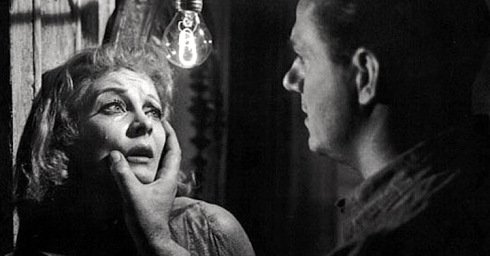
Throughout the play, Blanche keeps away from the light and never reveals her true age - a desperate attempt to remain sexually desirable and "still young" - source
Well, interestingly enough, there was an actual “Desire” line of streetcars that ran in New Orleans from the 1920s to late 1940s. The title itself is lifted from one of Blanche’s lines -
They told me to take a street-car named Desire, and transfer to one called Cemeteries, and ride six blocks and get off at—Elysian Fields!
It’s an obvious metaphor for Blanche’s life and social fall. As the play progresses, we learn that Blanche was married in her youth to a man named Allen, whom, she later found out, was gay. Blanche told her husband she was disgusted by him and the man shot himself in the head. A sign of the times, surely, and an interesting little observation, given that Tennessee Williams himself was gay.
After the death of her husband, Blanche falls into sexual depravity herself (hence the streetcar named desire) and loses her social standing, which then forces her to leave her hometown of Laurel, Mississippi.
Her arrival at Elysian Fields (the street on which the Kowalskis live) signifies a sort of afterlife for her, Elysian Fields, in Greek mythology, being the land of the dead. She has died, at least socially, and must now learn to live and accept the consequences of her actions.
Like Laura in ‘The Glass Menagerie’, Blanche DuBois is a clear reference to Williams’ older sister, Rose, a happy, extroverted girl, who was lobotomized by her parents (something Tennessee never forgave) and spent the rest of her life as a vegetable. It was rather common back in those days for parents to subject their children to such barbaric procedures, particularly more “unruly” young women, such as Blanche is, in the play.
It’s equally fascinating and horrible to see how much this event traumatized Tennessee Williams and how much of his work it inspired…
Something I find particularly interesting is the similarity to John Osborne’s Look Back in Anger. I actually Googled to see if Stanley Kowalski is recognized as a “angry young man” and it turns out it doesn’t, because that was a specifically British thing. But the stories are really similar. An angry, young middle-class man, abusive to his wife, sexually dominant is in conflict with her sister (or best friend, in Look Back..). The tension mounts, all set over the charming background of poverty and harsh living conditions, and culminates in a sexual encounter between the two. Both plays are about escaping reality, on some level. Anyway, that seems really interesting to me.
Of course, there is the 1951 film adaptation starring Vivien Leigh and Marlon Brando, which I highly recommend that you watch. I hope this post has helped you in understanding this theater classic or perhaps exposed you to a new story altogether.
So, have you seen/read ‘A Streetcar Named Desire’? What did you think?
Authored by @honeydue
Click on the coin to join our Discord Chat

Witness proposal is here:
Go To Steem Witness Page
In the bottom of the page type: adsactly-witness and press vote.

Use small letters and no "@" sign. Or, click here to vote directly!
Thank you!
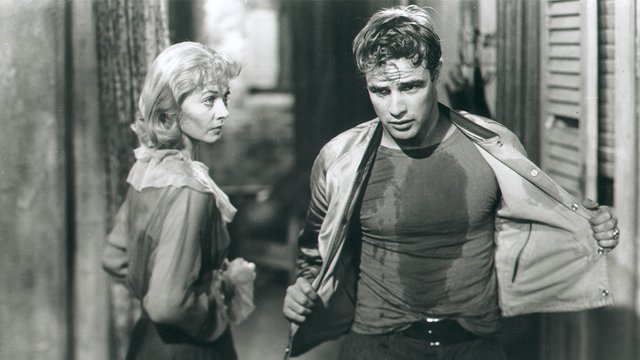
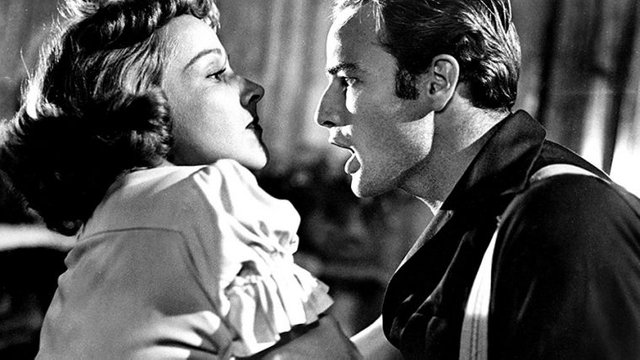
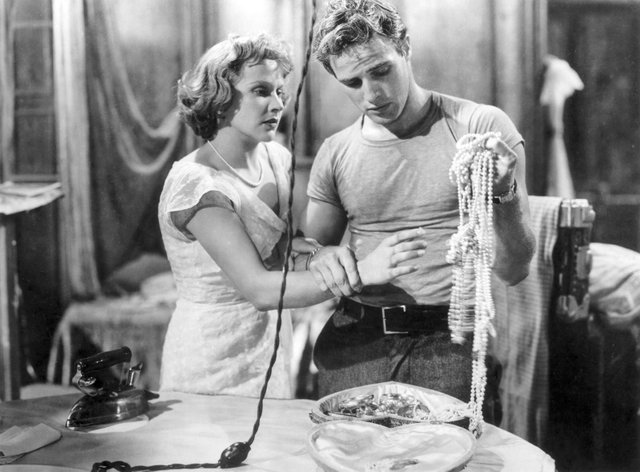
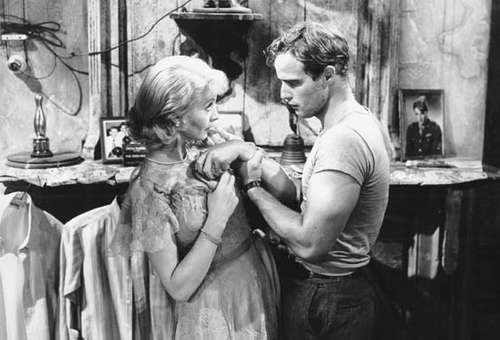
Nice post! I actually managed to ride the streetcar formerly named Desire as it was running at that time on the Canal St line.
This was 22 years ago, way before Katrina when New Orleans had a lot of charm.
If you once go to New Orleans get on the old streetcars to get a feeling about it.
Posted using Partiko Android
This is the type of literary work, which one first knows the cinematographic adaptation and then reads the written work. When they tell me about a tram called desire, I don't think of the play, which I have often seen staged, but I can't help but think of one of the best films by Elia Kazan, the beautiful Vivian Leigh and a young Marlon Brando. I remember seeing this play many times and suffering a kind of claustrophobia and despair as the story unfolds. I think Blanche's character is one of those who make an actress look good, show off her full potential, because it's really very well constructed and it's of unparalleled dramatic richness. I didn't know about the title and the trams in New Orleans. Thank you for sharing that information. Greetings, @honeydue.
"A tram called desire" has always seemed to me one of the phrases with the best titles, because of its metaphorical richness and, consequently, significant. The journey as a displacement in the field of corporal and affective subjectivity, can be one of many interpretations.
In addition to reading it, I had the opportunity to see the work represented once in a theater festival, as well as the film version of Elia Kazan. I have it as a key piece of contemporary theater, which knows how to stage the terrible shadows that constitute us as human beings: This makes it an heiress and, at the same time, a renewal of the best ancient Greek drama. The characters and their conflicts are sharply posed, from the somewhat skeptical vision of Tennessee Williams, so typical of mid-century writers.
Thanks for your good post, @honeydue. Greetings.
I watched the movie first, out of curiosity about the Brando hype. I had watched him in a couple of his later movies and could not believe he was ever a sex symbol, despite his strong political views.
I liked the movie and felt compelled to read the play, which I loved. I have never seen it performed on stage, unfortunately.
I find the story very challenging to what has been America's ever troubling false-ad stereotypes.
What you mentioned about reality raping fantasy has happened in every era and yet there is always this blind sense of hope and optimism about the endless possibilities of self-realization and follow-your-guts/dreams kind of promotion.
The so called loss of innocence is invoked after every great social or political conflict/scandal, but as Williams suggests, we never learn.
Lust and social pressure will always get the best of us and reality will always rape us as long as we continue pursuing dreams with the wrong tools.
Hi, @adsactly!
You just got a 0.32% upvote from SteemPlus!
To get higher upvotes, earn more SteemPlus Points (SPP). On your Steemit wallet, check your SPP balance and click on "How to earn SPP?" to find out all the ways to earn.
If you're not using SteemPlus yet, please check our last posts in here to see the many ways in which SteemPlus can improve your Steem experience on Steemit and Busy.